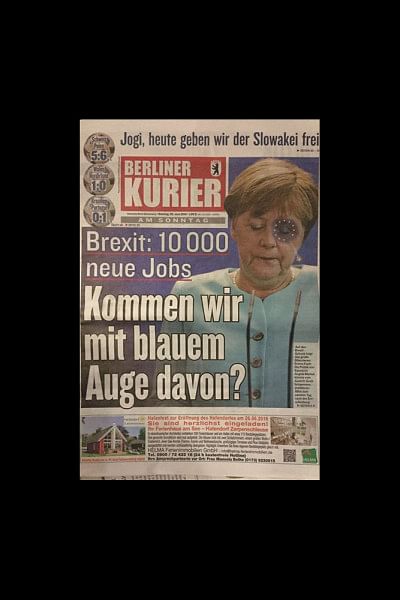Brexit: Berlin eyes Britain’s tech talent
Over the weekend, while German Chancellor Angela Merkel was hurriedly convening a meeting of European leaders to assess the aftermath of Britain's choice to leave the EU, Cordelia Yzer was on the phone.
The Berlin Senator for Economics and Technology was not chatting to fellow politicians, but with start-ups and global funds, who, in the wake of Brexit, are now considering Germany's capital as their base.
"Those companies who have headquarters in London are aware that they need to be in the EU," she says.
"We had competition in the last two or three years between London and Berlin. I am convinced that more funds will now make the decision in favour of Berlin."

"We will now take advantage [of Brexit]," she asserts. "And this is more than fair."
Berlin, a city with as good a claim as any to be considered the spiritual heartland of the European project, is mourning the loss of the UK, with which it has deep historical and cultural bonds as well as a strong trade partnership.
But there may be just a touch of schadenfreude in the air too.
"Brexit: 10,000 new jobs" ran the headline of the Berliner Kurier tabloid on Sunday, adding: "Might we emerge with [just] a black eye?"
Mass migration?
Indeed, many commentators and economists are betting on Britain not being allowed back into the single market, at least not with all the benefits it previously enjoyed.
"Nobody wants to block the British," says Senator Yzer. "But they made the decision to quit."
The ex-mayor of London and Leave campaigner Boris Johnson, she adds, "will have to explain to the British the burden he put on them by making the decision in favour of Brexit".
While financial services jobs could flow from London to Frankfurt, Berlin, which has a vibrant tech and small business scene, wants to nab that sector's finest for itself.
If there is a mass migration from East London's "Silicon Roundabout" to the German capital, they will find a community with titans such as Soundcloud and Wooga, and one that is rapidly expanding.
"We have more demand than we have office space at the moment," says Travis Todd, chief executive of Silicon Allee, a group currently building a six-floor campus for start-ups in central Berlin, which will house 2,000 workers.
And more may be coming.
"People are already asking, 'What is the alternative to London?'" he says. "If it's going to be much harder to get investment in London, to hire people in London, you are going to see a lot of those companies moving to places where they can do international business."
'As entrepreneurs we adjust'
It's not just access to the single market that could lure young techies to Berlin - there's also an entrepreneurial and pioneering atmosphere, and few companies better encapsulate this than ResearchGate, a social network for the scientific community with more than 10 million users, and with high-profile investors such as Bill Gates.
Its founder, Ijad Madisch, is as confounded by Brexit as many of his contemporaries are in London.
"The young people all voted for being in the EU, and this is a clear signal," says Madisch, whose Superman cap and grey slacks belie his background as an accomplished virologist. "You cannot just negotiate this away."
Indeed the very idea of pulling up the drawbridge is an anathema to him.
"This whole country thing is a very old thing," says Madisch. "I'm not a big fan of these separations between countries. But as entrepreneurs we always adjust to political environments."
Not everyone is so sure.
London advantages
On the other side of town, Artur Fischer runs the Berlin Boerse stock exchange, which promotes itself as being a gateway to European markets.
He says talk of tech firms flocking to Berlin comes from those who "underestimate what makes London London".
"There will not be a huge exodus in my opinion," he explains. "London has its own unique ecosystem, it attracts the best skill-set from the whole world, including Europe, and that's not going away."
One of the advantages London has is a large financial hub, as well as a tech scene, and a framework in which the two interact.
This might not be so easy to replicate, says Fischer, and consequently, we might end up with a "fragmented situation" in Europe, where "we do not have another single centre which competes directly with London".
Instead, business could be spread between Frankfurt, Milan, Paris and other cities.
Ultimately, all business leaders in Berlin can do is try to make predictions - they don't know what kind of a deal will be struck between Westminster and Brussels, and they don't know how long it will take.
But in the meantime, Senator Yzer is making her pitch directly to young Britons.
"Young people who voted In are welcome in Berlin," she says, staring out of the window of her office, just a few steps away from the square in which John F Kennedy gave his iconic "Ich bin ein Berliner" speech.
"They are welcome, their talent is more than welcome. It's a great place to live and we also speak English.
"Berlin is a place where their dreams can come true."

 For all latest news, follow The Daily Star's Google News channel.
For all latest news, follow The Daily Star's Google News channel. 







Comments